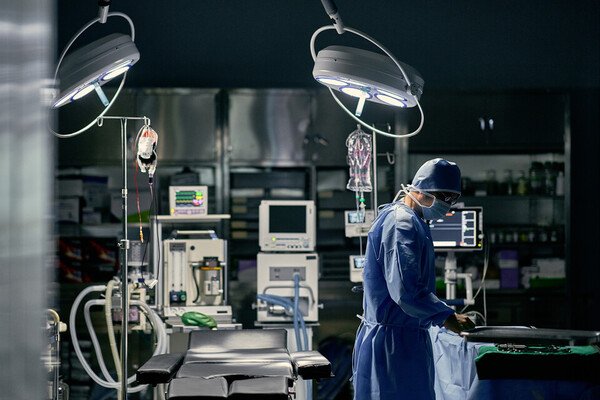The year 2023 marked significant transformations in the medical and pharmaceutical sectors. Despite facing resistance from the medical community, President Yoon Suk Yeol's administration declared its intention to increase the number of medical school seats starting in 2025. Additionally, 2023 witnessed the opening of the digital medical device market. The initiation of telemedicine this year led to an ongoing conflict between the medical community, opposing such practices, and the Ministry of Welfare, advocating for them, expected to persist into 2024. In the pharmaceutical industry, numerous domestic companies ventured into the global market. Korea Biomedical Review has compiled the 10 most noteworthy healthcare developments in 2023. -- Ed.

On January 9, 2023, Health and Welfare Minister Cho Kyoo-hong presented key policies, including increasing medical school seats, to President Yoon Suk Yeol.
Following the report, the Welfare Ministry urged the medical community to activate a council to discuss this matter.
Despite the Korean Medical Association's initial opposition to expanding medical school admission quotas, they agreed to resume discussions in the Medical Issues Consultation Group, citing the need for broader discourse on various topics.
The Consultation Group reconvened on Jan. 26 after a three-year hiatus.
Calls for new medical schools and increased quotas surged from the National Assembly and local governments, pressuring the medical community.
In June, as the government transitioned the Covid-19 situation from “crisis” to an “alert” phase, the medical community was compelled to address expanding medical school quotas.
Minister Cho officially announced the government's intent to increase quotas for the 2025 academic year in a media interview in early June.
Subsequent disagreements between the government and the medical community persisted, culminating in a mutual agreement during the 10th Medical Issues Consultation Group to explore “evidence-based approaches for expanding the doctor workforce to bolster essential and provincial medical care.”
In mid-October, rumors circulated that the government, led by President Yoon, had decided on a minimum increase of 1,000 students for the expansion of medical school seats.
While the government swiftly refuted the rumor, its repercussions were substantial. The medical community, in disagreement with the expansion, found itself shocked. Conversely, political factions and local administrations, advocating for the increase, heightened their anticipation for larger expansions in regional medical school quotas and the establishment of new medical schools, surpassing initial expectations.
Subsequently, the government persisted in asserting that "the count of medical school quotas is yet to be determined," while actively pursuing the confirmation of numbers. In November, findings from the medical school quota demand survey involving 40 medical schools nationwide were disclosed. In the survey, the medical schools requested an increase of up to 2,847 by 2025 and a maximum of 3,953 by 2030.
The government's persistent efforts to expand medical school quotas, despite resistance from the medical community, have led to the Korean Medical Association initiating a general strike. Following a vote among its members to determine the course of action, the KMA organized a rally on Dec.17 in Gwanghwamun, Seoul, as a means to exert pressure on the government.
However, in addition to the general strike, the KMA is pursuing a two-track strategy. This approach involves ongoing discussions with the government regarding the expansion of medical school quotas based on scientific evidence through the Medical Issues Consultation Group, indicating a willingness to explore future dialogue on the matter.
With the government officially confirming the expansion of medical school quotas starting in 2025, the specific size of the increase is anticipated to be disclosed no later than early 2024. This development raises apprehensions that the Yoon administration might leverage the expansion of medical school seats for political advantage in the 2024 general election. The lingering matter of increasing medical school quotas, which has been a focal point in the medical community throughout 2023, is foreseen to persist into the next year, influencing not only the medical field but also the broader Korean society.
Related articles
- [Analysis] Why do Korean students obsess over admission into medical schools?
- Universities want to add up to 4,000 medical students by 2030
- Government clarifies medical school enrollment quota amid speculations
- Localities compete to secure increased medical school student quota
- Increasing doctors is no solution to essential care crisis: psychiatrists
- Even 1,000 more physicians won’t solve problems, angry practitioners say
- Health minister hints medical school enrollment quota could increase soon
- Health minister reveals will to reduce oriental doctors to increase physicians
- [Top 10 Healthcare News in 2023 ③] The evolution of digital therapeutics in 2023
- [Top 10 Healthcare News in 2023 ④] Chong Kun Dang, Orum Therapeutics prove R&D power
- [Top 10 Healthcare News in 2023 ⑤] Telemedicine pilot project starts without law amendment
- [Top 10 Healthcare News in 2023 ⑧] Alarm bells of collapsing essential care were heard everywhere
- [Top 10 Healthcare News in 2023 ⑦] Korean CDMO companies show strong presence in global market
- [Top 10 Healthcare News in 2023 ⑨] Korean pharmaceutical companies expand foothold in global markets
- [Top 10 Healthcare News in 2023 ⑩] Controversy continues over drug quality amid frequent mislabeling
- Doctors express ‘regret’ at reports on sharp increase in physicians
- Korea's health minister stresses need to increase medical students at OECD meet
- Medical community gears up for showdown as government mulls surge in medical school enrollments

